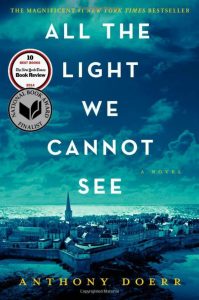In socials studies class we have been studying WWII. In most wars there is no good side and bad side, there is just soldiers, citizens, and dictators all hoping or fighting for the same outcome. Every country has its own perspective that should be acknowledged. That’s why we were able to pick one of three novels that each told a whole different story of WWII.
The book I chose was All The Light We Cannot See by Anthony Doerr. 
After we had about three weeks to finish our novel, we wrote a book review on it.
We learned what makes a good book review by reading examples and making a mind map together on what aspects we noticed were included.
For this assignment we had two drafts. The first draft we got a peer critique.This was very helpful because I was able to see what I missed and what could make stronger.
Here is my final book review enjoy!
Book review: Anthony Doerr’s All The Light We Cannot See gives light to valuable and interesting perspectives during WW2
All The Light We Cannot See
By Anthony Doerr
Pages 544pp. Scribner. $27
All The Light We Cannot See by Anthony Doerr tells more than the heartaches, distruction and cruelty to fellow human beings during World War II. Doerr sends the message that at the end of the tunnel there is light no matter how dark it is.
Anthony Doerr was born in Cleveland Ohio. He majored in history at Bowdoin College in Brunswick, Maine then earned an MFA from Bowling Green State University. He has also written the story collections Memory Wall and The Shell Collector, the novel About Grace, and the memoir Four Seasons in Rome.
This novel tells the story of two protagonists, both children who are experiencing the horrors of World War II. The two stories are combined as Werner and Marie-Laure meet from seemingly effortless but in extraordinary circumstances.
Even though the characters are not based on fact, Anthony Doerr completely fooled me. It’s nearly unbelievable that he created these characters that match the setting and enhance the story without experiencing the war himself.
The author first introduces the reader to Marie Laure, a girl who becomes blind when she is young. Doer uses sensory skills to describe her developing a new perspective. Doerr writes, “The world pivots and rumbles. Crows shout, brakes hiss, someone to her left bangs something metal with what might be a hammer. She shuffles forward until the tip of her cane floats in space”.
Werner and his sister Jutta represent how German children saw Hitler and what was being drilled into their brain. Werner and Jutta are orphans, and the beginning of the war changed their lives in simple but influential ways. Hitler did get Germany out of the Great Depression and this caused many to believe he would bring glory back to Germany. For example, Doerr describes, “Indeed it does seem to Werner, as the weeks go by, that something new is rising. Mine production increases; unemployment drops. Meat appears at Sunday supper. Lamb, pork, wieners—extravagances unheard of a year before”. Jutta seemed to have a different perspective of what was going on. Even though she was younger than Werner, she wasn’t fooled by the Nazi propaganda. When Werner confronted her for listening to a foreign radio staition she stated, “That’s what I’m listening to, Werner. Our airplanes are bombing Paris”. She knew what was going on wasn’t right and didn’t want to stand idly by.
Anthony Doerr definitely made interesting choices when creating this novel. There were often times were he didn’t shine the light on substantial events in the story as a reader might have expected. His writing style didn’t allow the reader to achieve a deep understanding, because he changed back and fourth between two different stories and at times did not conclude key events. For example, Werner, one of the protagonist, dies very sudden and obscurely. Doerr wrote, “But Werner has crossed the edge of the field, where he steps on a trigger land mine set there by his own army three months before, and disappears in a fountain of earth”. Once the reader is told of Werner’s death, the chapter ends followed by the next chapter which has a completely different tone. This style moves the reader too quickly, and does not allow for the opportunity to digest what had just occurred to one of the protagonists.
Throughout the novel even when the characters are facing terrible times in World War II they find some light shining through the darkness. Such as Werner’s interest in fixing radios or Marie Laure falling in love.



Overall the Book Review was very well structured but, I found a few things that you could possibly change such as the title of the book at the beginning of the book reveiw is not in italics. Another thing that I noticed is that you used the same photo twice, a way to fix that is by simply finding a photo that relates to that most recent paragraph. The last thing I noticed was that towards the end of the page, there were no photos to break up the text, and I feel that that could help the visual aspect of the book review.
Ethan Dennis